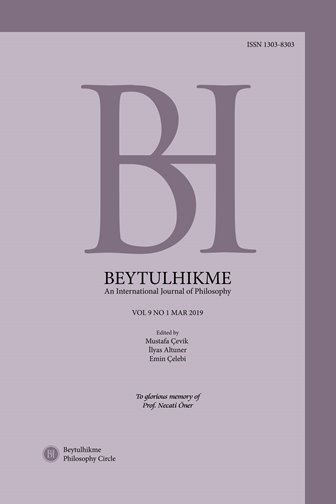Author :
Abstract
Scotus, Ortaçağ Hristiyan teolojisinin olgunlaşma döneminin önemli şahsiyetlerinden biridir. Scotus’un ele aldığı konuların hemen hepsinin merkezinde, aynı zamanda Ortaçağın en çok tartışma konusu olan iman ve akıl arasındaki ilişkinin tesis edilmesi problemi yer alır. Akıl ve iradenin ilişkisine dair konularda, Scotus’un düşünceleri birçok yönden Augustinuscu-Fransisken geleneğin izlerini taşır. Onun için de Hıristiyanlığın ahlâkî ve dinî içeriği, inancın kuramsal yapılandırmalarından daha anlamlıdır. Scotus, her şeyin zorunlu ve değişmez olduğunu iddiasını, mantık örgüsü güçlü olan bir teoriyle çürütme yoluna gitmiştir. Bu bağlamda “eşzamanlı olumsallık” diye kavramlaştırdığı parlak bir keşifte bulunmuştur. Scotus’un klasik Hristiyan anlayışını derinden etkileyen bu olumsallık teorisinin esası, fiilî gerçekliğin gerçekte olandan farklı da olabilmesine dayanır. Olumsal gerçeklik teorisi, bir nevi Hıristiyan düşüncenin Antik Yunan düşüncesinden kurtulmasını ifade etmektedir. Olumsallık teorisinin özünü zıtların aynı anda mümkün olması oluşturur. Scotus’un sistematik düşüncesi, zorunluluk teolojisi ve olumsallık teolojisi arasındaki ana yöntemsel ayrıma dayalı olarak oluşturulur. Zorunlu önermelerin yanı sıra olumsal önermelerin bilgisi de bu doktrine bağlıdır. Gerçekte olumsal önermeler, teolojinin en büyük kısmını oluşturur.
Keywords
Abstract
Scotus is an important figure in the maturation period of medieval Christian theology. In the center of almost all of Scotus's issues, there is also a problem of establishing the relationship between faith and reason, which is the subject of much debate in the Middle Ages. In matters relating to the relationship between reason and will, Scotus's thoughts bear the traces of the Augustinian-Franciscan tradition in many ways. Therefore, the moral and religious content of Christianity is more meaningful than the theoretical constructs of belief. Scotus sought to undermine the claim that everything was necessary and unchanging, with a strong theory of logic. In this context, he made a brilliant discovery which he conceptualized as 'simultaneous contingency'. The essence of this contingency theory, which deeply influences the classical Christian conception of Scotus, is based on the understanding that actual reality can be different from what actually is. The theory of contingent reality, in a sense, refers to the liberation of Christian thought from the ancient Greek thought. The essence of the theory of contingency of Scotus is the fact that opposites are possible at the same time. The systematic thought of Scotus is based on the main methodological distinction between the theology of necessity and the theology of contingency. In addition to the compulsory propositions, the knowledge of contingent propositions depends on this doctrine. In addition to the compulsory propositions, the knowledge of contingent propositions depends on this doctrine. In fact, contingent propositions constitute the largest part of theology.
Keywords
- Altuner, İ. (2017). Some Remarks on Averroes’ Long Commentary on the Metaphysics Book Alpha Meizon. Entelekya Logico-Metaphysical Review, 1 (1-2), 1-17.
- Augustinus (1999). İtiraflar. (Çev. D. Pamir). İstanbul: Kaknüs Yayınları.
- Broadie, A. (1995). The Shadow of Scotus, Edinburgh: T. & T. Clarc.
- Cevizci, A. (1999). Ortaçağ Felsefesi Tarihi. Bursa: Asa Kitabevi.
- Copleston, F. (1954). A History of Philosophy. New York: Image Books.
- Dekker, E. (1998). Scotus Freedom of the Will Revisited. John Duns Scotus: Re- newal of Philosophy. (Ed. E. P. Bos). Amsterdam: Rodopi.
- Gilson, E. (1978). History of Christian Philolopy in the Middle Ages. New York: Ran- dom House.
- Gilson, E. (2007). Ortaçağda Felsefe. (Çev. A. Meral). İstanbul: Kabalcı Yayınevi.
- Jones, W. T. (2006). Batı Felsefesi Tarihi 2: Ortaçağ Düşüncesi. (Çev. H. Hünler). İstanbul: Paradigma Yayınları.
- Küçükalay, A. M. (2017). Adil Fiyat: Antik Yunan’dan 16. Yüzyıla. İstanbul: Ötüken Yayınları.
- Langston, D. C. (1986). Gods Willing Knowledge. Philadelphia: Pennsylvania State University Press.
- Peterson, M. vd. (2006). Akıl ve İnanç: Din Felsefesine Giriş. (Çev. R. Acar). İstan- bul: Küre Yayınları.
- Quinton, A. (1967). John Duns Scotus. The Encyclopedia of Philosophy. (Ed. P. Edwards). New York: Macmillan.
- Sahakian, W. (1990). Felsefe Tarihi. (Çev. A. Yardımlı). İstanbul: İdea Yayınevi.
- Scotus, D. (1975). God and Creatures: The Quodlibetal Questions. (Eds. F. Alluntis & A. B. Wolter). London: Princeton University Press.
- Scotus, D. (1994). Contingency and Freedom (Lectura I 39). (Trans. A. vos Jaczn). Dordrecht: Kluwer Academic Publishers.
- Scotus, J. D. (1986). Will and Morality. (Trans. & ed. A. B. Wolter). Washington: Catholic University of America Press.
- Scotus, J. D. (1992). Scotus’ Early Oxford Lecture on Individuation. (Trans. & ed. A. B. Wolter). Santa Barbara: Old Mission.
- Thilly, F. (2000). Bir Felsefe Tarihi. (Çev. N. Küçük & Y. Çevik). İstanbul: İdea Yayınevi.
- Vorlander, K. (2004). Felsefe Tarihi. (Çev. M. İzzet vd.). İstanbul: Kitabevi.
- Vos Jaczn, A. (2000). Scotus on Freedom and the Foundation of Ethics. Leiden: Brill.
- Weber, A. (1998). Felsefe Tarihi. (Çev. H. V. Eralp). İstanbul: Sosyal Yayınlar.
- Wolter, A. B. & O’Neill, B. (1993). John Duns Scotus: Mary’s Architect. New York: Franciscan Institute Publications.
- https://w2.vatican.va/content/benedictxvi/en/speeches/2006/september/document s/hf_ben-xvi_spe_20060912_university-regensburg.html. Öz: Scotus, Ortaçağ Hristiyan teolojisinin olgunlaşma döneminin önemli şahsiyetlerinden biridir. Scotus’un ele aldığı konuların hemen hepsinin merkezinde, aynı zamanda Ortaçağın en çok tartışma konusu olan iman ve akıl arasındaki ilişkinin tesis edilmesi problemi yer alır. Akıl ve iradenin ilişkisine dair konularda, Scotus’un düşünceleri birçok yönden Augustinuscu-Fransisken geleneğin izlerini taşır. Onun için de Hıristiyanlığın ahlâkî ve dinî içeriği, inancın kuramsal yapılandırmalarından daha anlamlıdır. Scotus, her şeyin zorunlu ve değişmez olduğunu iddiasını, mantık örgüsü güçlü olan bir teoriyle çürütme yoluna gitmiştir. Bu bağlamda “eşzamanlı olumsallık” diye kavramlaştırdığı parlak bir keşifte bulunmuştur. Scotus’un klasik Hristiyan anlayışını derinden etkileyen bu olumsallık teorisinin esası, fiilî gerçekliğin gerçekte olandan farklı da olabilmesine dayanır. Olumsal gerçeklik teorisi, bir nevi Hıristiyan düşüncenin Antik Yunan düşüncesinden kurtulmasını ifade etmektedir. Olumsallık teorisinin özünü zıtların aynı anda mümkün olması oluşturur. Scotus’un sistematik düşüncesi, zorunluluk teolojisi ve olumsallık teolojisi arasındaki ana yöntemsel ayrıma dayalı olarak oluşturulur. Zorunlu önermelerin yanı sıra olumsal önermelerin bilgisi de bu doktrine bağlıdır. Gerçekte olumsal önermeler, teolojinin en büyük kısmını oluşturur. Anahtar Kelimeler: Epistemik çaba, bilgi edinme, dışsalcılık, içselcilik, bilmenin ikici yolu.
- [*] Bu makale, yazarın 2008 yılında Ankara Üniversitesi Sosyal Bilimler Enstitüsü’nde
